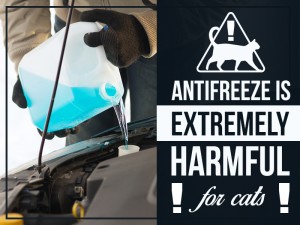
Antifreeze is extremely harmful for cats!

Antifreeze is highly toxic for pets. This substance is easily found in households all over the UK during the cold months, since it is commonly used to de-ice windshields after a cold night.
Antifreeze and water coolant from cars contain ethylene glycol, a chemical that is extremely poisonous for pets if ingested, even in very small amounts. This type of poisoning leads to kidney failure and it is often fatal. Cats are particularly sensitive to the damaging effects of this substance.
Common signs of antifreeze poisoning include appearing uncoordinated, vomiting, depression, lethargy, breathing difficulties, fits and ultimately death.
Cats usually have access to this chemical when it leaks from a car's engine or when it is spilled somehow. It is not uncommon for cats to hide under cars for warmth during the colder months and if the liquid is leaking, the puddle that forms on the ground is very likely to be the only liquid that is not frozen around the area. An outdoor thirsty cat will easily find it and drink it. Cats can also step on the liquid and swallow it when they groom their coat or their paws afterwards.
The best way to avoid these accidents is to check your car regularly to ensure it is not leaking water coolant. It is also recommended storing antifreeze in secure containers, safely kept away from pets. Spills should be cleaned up as quickly as possible to avoid the possibility of a cat drinking or stepping on this substance.
If you notice any of the previously mentioned signs on your pet or if you suspect he or she may have ingested ethylene glycol, please do not hesitate and take him or her to the vet immediately. Early treatment is your pet's best chance of survival and recovery!
Would you like to know more about cats? Check our Feline Courses:
Feline courses
Published: 17 Dec 2015
Read the previous article: Holiday hazards for pets

